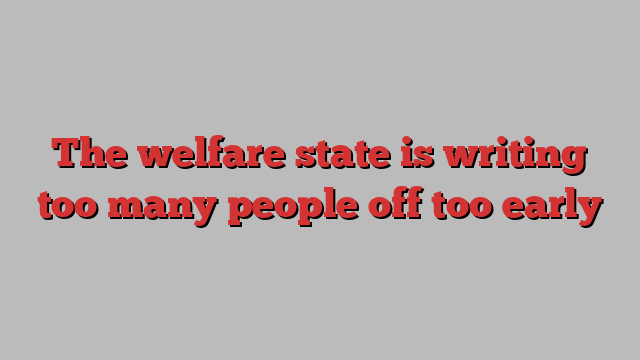
Unlock the Editor’s Digest for free
Roula Khalaf, Editor of the FT, selects her favourite stories in this weekly newsletter.
Is Britain a nation of strivers or shirkers? It might seem more like the latter, with some people “working” from the beach, and a staggering one in five neither working nor looking for a job. But it turns out that the majority of people who have been defined as economically inactive would actually quite like a job, thank you very much.
This finding — from a year-long study in Barnsley, South Yorkshire — suggests that the welfare state is writing off too many people too early. And that Britain’s uniquely high levels of economic inactivity (those not in paid work and not looking for work), post-Covid, are not intractable. It couldn’t have come at a better time for the new government, which knows it can’t get the country growing without getting it working, and which has been spooked by the strength of feeling at the election about immigration.
Barnsley is a classic post-industrial town, a former mining community that endured mass unemployment in the 1980s. More than a quarter of its working-age adults are neither working nor seeking a job. For decades, the struggles of people with poor prospects and little opportunity were masked for decades by companies substituting migrant labour.
Today, there is the added impact of poor health: the creeping scourge of chronic disease and the explosion in obesity, which hits the poor hardest, along with the NHS backlog and the mental health struggles of youngsters. But Barnsley has never given up — local leaders are fighting to get local bus services to coincide with warehouse shifts. Nor have its people. Seven in 10 of those surveyed by Barnsley’s Pathways to Work Commission said that they would like to work, if they could find a job that fitted their circumstances.
If these numbers hold even remotely true across the rest of Britain, it means that the official unemployment statistics are leaving out most of the people who would like a job. The jobcentres, and much careers advice and coaching, cater only for those defined as “unemployed”. Health and employment services pass like ships in the night. If the hospital fixes Janice’s bad hip, no one turns up to ask if they can help her get back into work. Yet there is substantial evidence that the longer someone is out of work, the less likely they are to get back in.
This is a human tragedy, and a bureaucratic mess. There are 51 national “employment support” programmes, led by 17 public bodies. But they don’t seem to be doing much good. Economically inactive people who say they want a job are no more likely to get one than those who do not want to work at all, according to the Learning and Work Institute think-tank.
Speaking in Barnsley, the new work and pensions secretary, Liz Kendall, pledged that the “department for welfare” would become a “genuine department for work”. There were sensible words about the need to improve health, skills and childcare. A big question is how far she will dare to go in reversing changes made to the benefit system in 2017 and 2018 that mean it now pays to be classified as permanently incapable of work. Had it not been made easier to get incapacity benefit, according to the Office for Budget Responsibility, there would have been 670,000 fewer approved claims between 2017 and 2022.
This is tricky political territory for any party. The rules were eased after pressure from campaign groups that said the system was too punitive, with some awful cases of suicide. But Britain was one of the best performers in the G7 before the rules were eased: between 2010 and 2020, the number of economically inactive people of working age fell from 9.5mn to 8.4mn.
Only a quarter of those in the Barnsley survey disagreed that they would feel happier if they were in work. But more than a third feared they would be worse off financially. This will dismay everyone who worked over the past two decades to make work pay — most notably James Purnell under Gordon Brown and Iain Duncan Smith under David Cameron. As the late, great Frank Field MP pointed out long ago, it’s not rational for people on the breadline to risk leaving the social security lifeboat to take an insecure job — why not let them try out a job without immediately losing benefits?
The fundamental political challenge hasn’t changed: how to distinguish between the severely and permanently disabled, who deserve more support than they are getting, from those whose afflictions may be temporary if they can get timely help. The Barnsley report shows the madness of the one-way street that assesses people once and categorises them forever. The resulting cost will cripple Sir Keir Starmer’s room to spend on other things: the bill for incapacity benefits is set to reach £29bn by 2027-28. But the cost is also counted in human misery.
The reaction to Kendall’s mild-sounding remark that the new government will expect people to engage with support, look for work and take jobs when they are offered them shows where the new battle lines will be drawn. Although her message was very much one of support, some disability campaigners have already responded with fear and fury.
Before the election, it wasn’t clear whether Labour would grip these problems head-on. But the strong performance of Reform UK — coming second to Labour MPs in 89 seats — has meant this issue has to be tackled. The case for action is not just economic, it is political, with the country near full employment but at the limit of its tolerance for immigration. The “Red Wall” has often been lazily presented as a bunch of working-class people who want state handouts. But it isn’t, and that is very good news indeed.